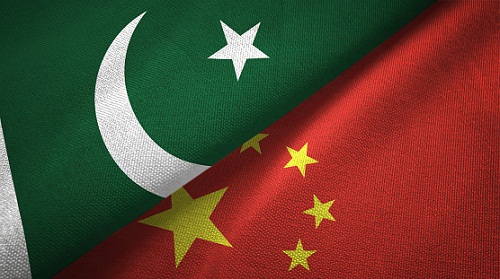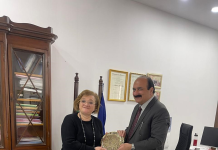BEIJING, Sept 16 : A Pakistani founded a new textile material startup in Shanghai to promote Sino-Pak bilateral cooperation in textile sector.
“I have founded a new textile material startup in Shanghai’s Lingang New Area. Although it is new-born, I’m full of expectations,” said Faizan Shafiq from the Donghua University in an interview with China Economic Net.
“Since I was a child, I have heard ‘long live the Sino-Pakistani friendship’ countless times. From then on, I had a strong curiosity about China,” Faizan mentioned.
He came to China the first time seven years ago, and in 2017, in order to pursue studies in textile industry, he passed the application and began to study for a Ph.D. degree in textile chemistry in Donghua University, Shanghai.
Born in Faisalabad, the hub of textile industry in Pakistan, Faizan joined the field naturally. “Nowadays, many materials are technologies being used in the textile industry cause environmental disruption.”
He was determined to develop a new environment-friendly material. After a series of experiments, Faizan created a new kind of dye obtained from natural plants instead of chemicals.
He hopes that in the future, more and more people can wear cloths dyed by his invention, “The process of extracting dyes from plants fascinates me. We’re using it on cotton cloth and silk. I am always committed to the green transformation of the textile industry,” noted Faizan.
In this way, Faizan was determined to start his own business in China. His idea was supported by his doctorial tutor. Faizan and his Chinese classmates completed the research and development of the new dye in the laboratory, then his tutor found a foundry for him.
The sales of new products are mainly focusing on the European and American markets that have a certain degree of acceptance of environmentally friendly materials. And in the future, the Chinese market that has promoted the low-carbon lifestyle will also be the top priority, according to Faizan.
This spring, Faizan learned that in Shanghai’s Lingang New Area, foreign students studying in Shanghai universities can also start their own businesses.
With the joint efforts of the staff of the International Student Pioneer Park, his company was quickly established.
“Pakistan has a lot of advantages in the textile sector, like rich labor resources and low labor costs. And Pakistan has signed a free trade agreement with China. So it can access a very big consumer market in the world,” Faizan analyzed,
“On the other hand, our government are encouraging innovations in many fields. If we just sell textile raw materials, the economic benefits can only be maintained at a very low level.
If we have the vision and courage to try new fabrics, new methods, new processes even new marketing modes, it will multiply our benefits.” Regarding the China-Pak cooperation in this field, Faizan said China has played a key role in Pakistani textile industry as now all the metal items are imported specially from China, as well as advanced production machines. “We can innovate boldly under the framework of China-Pakistan technical cooperation.
“I’ll graduate next year. At that time, our company will start marketing and accepting orders. As a microcosm of China-Pak cooperation, our company can get quality raw materials from Pakistan where has a well-developed textile base.
Meanwhile, because my corporate philosophy is in line with China’s current low-carbon hotspot and the 2060 carbon neutral goal that it is striving to achieve, we have got a series of preferential policies from the Shanghai Municipal Government. I hope that my company can grow step by step, and my products will be available on the Chinese market as soon as possible,” Faizan concluded with full confidence.












